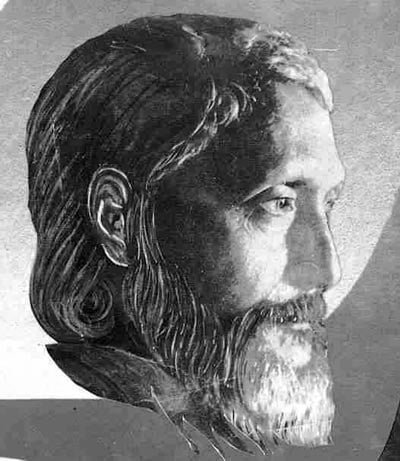
Suryakant Tripathi ‘Nirala’, one of the greatest Hindi poets of all times, was born on February 16, 1896. His father, Ram Sahai Tripathi, held double charge under the then king of Mahishadal in Bengal as a Police Officer and keeper of the State Treasury. His mother died when he was hardly 3 years old. ‘Nirala’ had his formal education only up to the 10th standard. However, he had already developed a great interest in Bengali, English, Sanskrit and Hindi literatures, thanks to the rich Royal Library at Mahishadal. He also excelled in singing, wrestling, shooting and writing.
It was during his adolescence that he was introduced to the poetry of Rabindranth Tagore who inspired him to be a poet. ‘Nirala’ was married at the age of 15. His wife, Manorama Devi, was a great lover of Hindi and it as partly due to her inspiration that ‘Nirala’ started writing poetry in Hindi. ‘Nirala’ had a son and a daughter—the latter’s death at the young age of 18 moved him to write one of the greatest elegies in Hindi poetry—Saroj Smriti. Nirala’s wife died in 1918. ‘Nirala’ was an independent man with a high sense of self-respect. He could not continue for long in Mahishadal and got interested in the teachings of Ramakrishna Paramhansa as ell as the National Movement for independence and the struggle for farmers and workers.
He resigned from his job in 1920 and decided to live on writing alone. ‘Nirala’ had staeted writing in 1916 and already had such a finished poem as Juhi Ki Kali behind him. His first collection of verse Anamika was published in 1922. He was offered the editorship of the Mawala in 1923 which he edited with rare zeal and insight. It as then that he started writing under the pen name ‘Nirala’.
The concept of ‘free verse’ or blank verse was almost unknown in Hindi till then. ‘Nirala’ broke the bonds of rhyme and in the face of almost universal antagonism championed the case of free verse in Hindi. He was ridiculed, boycotted and condemned for this, but he had such indomitable courage of his conviction that he lived to see free verse firmly established in Hindi. It would, however, be erroneous to suppose that he would not write in rhyme. Many of his best poems follow the rules of traditional poetry as well. ‘Nirala’ was a restless spirit and he shifted from Calcutta to Varanasi and went back to his ancestral village Garharkola. From there he went on to edit the Sudha at Lucknow and mature works like Geetika, Tulsidas (poetry), Alka and Apsara (novels) were written here.
He left Lucknow in 1940 and staying briefly at Unnao, Allahabad and Varanasi, finally settled down in Allahabad. Though ‘Nirala’ is known primarily as a poet, he has few rivals in the field of prose. In his novels like Billesurebakariha and short stories like Chaturi Chamar and Sukul ki Bibi, he writes about struggling men and women of India in style that is bereft of ornamentation and is extremely powerful in its stark directness.
‘Nirala’s life was one of tragedies, struggle and chronic poverty. The poet in him refused to bow before any individual. ‘Nirala’ remained a fighter throughout his life and had to pay a heavy price for it. He died in Allahabad on October 15, 1961. While he was often on the verge of penury, he would give away whatever money he had and even cloths, to the poor around him.

